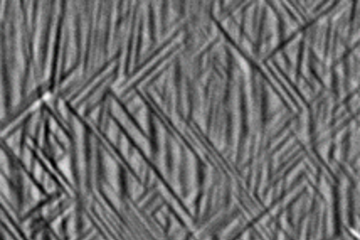All genres
461.
Talk
Insights into the stability and reactivity of solid/liquid interfaces from ab initio calculations. 71st Annual Meeting of the International Society of Electrochemistry "Electrochemistry towards Excellence", virtual, Belgrade, Serbia (2020)
462.
Talk
Modeling crystal growth and materials design in high dimensional chemical and structural configuration spaces. German Conference on Crystal Growth DKT 2020, München/Garching, Germany (2020)
463.
Talk
Materials Design in High Dimensional Chemical and Structural Configuration Spaces. TMS 2020 Annual Meeting & Exhibition, San Diego, CA, USA (2020)
464.
Talk
Ab Initio Phase Stabilities of High Entropy and Chemically Complex Alloys. TMS Annual Meeting, San Diego, CA, USA (2020)
465.
Talk
Interplay of chemistry and faceting at grain boundaries in a model Al-alloy. TMS Annual Meeting & Exhibition, San Diego, CA, USA (2020)
466.
Talk
Innovative concepts in materials design to boost renewable energies. Seminar of Institute for Innovative Technologies, SRH Berlin University of Applied Sciences, Berlin, Germany (2020)
467.
Talk
Construction and exploitation of large ab initio data spaces to design materials with superior mechanical properties. MRS-J: Materials Research Meeting 2019, Yokohama, Japan (2019)
468.
Talk
Automated ab-initio Determination of Materials Properties at finite Temperatures with pyiron. CNLS Seminar, Los Alamos, NM, USA (2019)
469.
Talk
Predicting atomic structure and chemical reactions at solid-liquid interfaces by first principles. Operando surface science – Atomistic insights into electrified solid/liquid interfaces (708. WE-Heraeus-Seminar), Physikzentrum, Bad Honnef, Germany (2019)
470.
Talk
Machine Learning in Materials: Screening and Discovery. National Institute of Advanced Industrial Science and Technology (AIST), Tsukuba, Japan (2019)
471.
Talk
Metastability High Entropy Alloy Design. MRS Fall Conference, Boston, MA, USA (2019)
472.
Talk
Ab initio descriptors to design materials with superior mechanical properties. Materials Day, ETH Zürich, Zürich, Switzerland (2019)
473.
Talk
How do grain boundaries transform on the atomic level? International Workshop on Advanced and In-situ Microscopies of Functional Nanomaterials and Devices, IAMNano 2019, Düsseldorf, Germany (2019)
474.
Talk
Interstitial alloying and stacking-fault energies in CrMnFeCoNi. 3rd German-Dutch Workshop on “Computational Materials Science” , Domburg, The Netherlands (2019)
475.
Talk
Chemistry at Lattice Defects Probed at Atomic Scale. 20th International Union of Materials Research Societies International Conference in Asia IUMRS, Perth, Australia (2019)
476.
Talk
Tuning stacking-fault energies and local lattice distortions in high-entropy alloys. Theory of Complex Disorder in Materials (TCDM2019) , Linköping, Sweden (2019)
477.
Talk
Ab initio description of coupling phenomena between magnetic and structural degrees of freedom. EASTMAG2019 – VII Euro-Asian Symposium “Trends in Magnetism”, Jekaterinburg, Russia (2019)
478.
Talk
Ab initio simulation of finite temperature phase stabilities: Concepts and application. HetSys Launch Event, Warwick, UK (2019)
479.
Talk
Phase stability and mechanical properties of high entropy and chemically complex alloys. MS&T Annual Meeting, Portland, OR, USA (2019)
480.
Talk
Ab initio guided materials design and discovery. Inaugural Symposium for Computational Materials, Moscow-Skoltech, Russia (2019)











